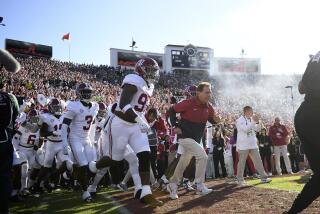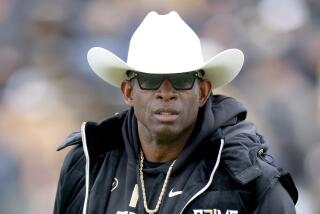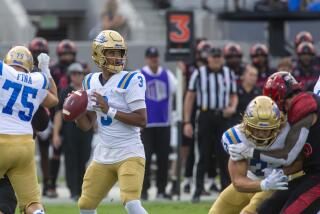In a State of Frenzy : Auburn: Coach Pat Dye has cultivated a powerful defense and reigns as Alabama’s football king on his own terms.
- Share via
AUBURN, Ala. — A receptionist nudges a can of bug spray with her foot.
“Ants,” she says. “We got ants all over the place.”
She’s going to need more than the one can. Beyond her desk is the heart of a $7.2-million, 88,000-square-foot concrete fortress known as the Auburn Athletic Complex. With walls thick enough to stop mortar shells, the year-old building is a testament to Pat Dye’s wildly successful football program, which keeps ringing up sellouts, Southeastern Conference titles and bowl appearances with startling regularity.
Most NFL teams, among them the Rams, who train at a converted elementary school, would weep if they saw this place. It has a plush locker room, saunas, an auditorium as big as a local Cineplex, a weight room that Schwarzenegger would love, Star Wars medical equipment, a radio and television studio complete with satellite system, even a planned museum to house, among other items, the Heisman Trophy Bo Jackson won here in 1985.
It is an impressive display of football power and, in a way, the building is a little like Dye himself--rough around the edges, immovable, as solid as one of the steel beams that frame this concrete castle.
This is Dye’s kingdom, all right. As Auburn’s athletic director, as well as football coach, he oversees a program second to none. His rollover contract guarantees him at least $300,000 a year, and there is a stipulation that calls for his $400,000 home to be paid off if he coaches through 1995. A $1-million annuity awaits, too, courtesy of the school’s athletic association. Dye, 50, has become to Auburn what Bear Bryant was to Alabama: He is a resource, a valued commodity and, on occasion, a bit of a pain.
Dye describes his players as “kids with grown-up bodies. In country terms, they’re considered yearlings.”
And Dye treats them as such, handing out love and discipline in equal doses. But attack one of his players and you attack him.
Dye admires loyalty. Wayne Hall has followed Dye from East Carolina to Wyoming to Auburn. For his troubles, Hall is defensive coordinator. But don’t press your luck with Dye.
Shortly before Auburn and Florida State signed a 10-year deal to play one another, Dye was confronted by an angry Hall. For the life of him, Hall couldn’t understand why Auburn would want to drop punchless Akron for potent Florida State, a defensive coordinator’s nightmare. The conversation, recalled Hall, was heated but very brief.
“I pay your salary to beat the Florida States,” Dye said that day. “If you don’t want to earn your salary, I’ll get somebody else.”
“Boss,” Hall said, “I love Florida State.”
Dye acknowledges that he often is dominated by his emotions.
“I am controlled by my heart a lot of times,” he said. “Probably a great deal of that gets me in trouble, too.”
Dye may have a point. He has won 81 games in only nine seasons at Auburn, six of those victories having been against archrival Alabama, and yet his name rarely is mentioned in the same breath with those of coaching peers Joe Paterno, Bobby Bowden or Don James. This, despite having the fourth-best winning percentage among active coaches.
His teams have won or shared four league championships and appeared in eight consecutive bowl games, yet Dye figured prominently in a “Coaches You Love to Hate” poll conducted by a Florida newspaper two seasons ago. He finished fifth, but that was before Barry Switzer, Jimmy Johnson, Jackie Sherrill and Bo Schembechler--the four ranked above Dye--left college football. Who knows where Dye would finish now.
And even when he extends a financial olive branch to Auburn’s academic community, which has been angered by Dye’s policies regarding players’ class performance, the reaction is often mixed.
This is a man on top of the world and also sometimes confounded by it. He has built a national football power but has done so on his own terms. A politician, he isn’t.
“The game has always been easy for me,” he said.
It’s life that keeps gumming up the works for Dye.
MAKING OF THE MAN
There are flash points in youth, little rites of passage that mold a person, make him what he is. Dye was faced with such moments when he was 14, living on a farm in tiny Blythe, Ga.
The third of four children, he was raised by tough, honest parents. His mother taught school, and his father, a hard-working man who smoked five packs of Camels a day “and drank enough whiskey to sink a battleship,” Dye said, labored in the fields.
“I could have made it then,” Dye said. “I could do a man’s work even then. My daddy gave me a man’s responsibility.”
At the first hint of daylight, Dye would help load the family truck with watermelons. A driver’s license was never considered; the family needed the money, so Patrick Fain Dye was dispatched to the country roads, where he battled the heat, a squeaky clutch, and hoped the local sheriff never caught him behind the steering wheel.
Most of the melons sold for a quarter--after all, this was 1953. But on occasion, an oversized melon might fetch a dollar, which was cause for celebration in those days. At dusk, or whenever the truck bed was finally empty, Dye could return home.
Dye learned duty and independence. He already knew about being tough, living with two older brothers in an area ruled by bullies.
When he was in eighth grade, Dye played his first football game. By his senior year of high school, he was being recruited by Tennessee, Georgia Tech and Georgia. He chose Georgia.
“Since I’ve left that farm, I feel like I’ve been running downhill ever since,” he said.
Dye was an All-Southeastern Conference lineman at Georgia. In 1965, he joined Bryant’s staff at Alabama and stayed there until 1974, when he accepted his first head coaching job, at EastCarolina.
After six consecutive winning seasons at the Greenville, N.C., school, Dye went to Wyoming for a year before Auburn hired him. It was a strange, stressful time.
When Wyoming officials learned of his interest in Auburn, they offered an ultimatum: Withdraw your name or be fired.
Dye resigned.
“You ever been unemployed in Laramie, Wyoming?” Hall asked. “I remember Coach Dye asking, ‘Can we win at Auburn?’ I said, ‘Heck, yeah, we can win at Auburn.’ ”
But according to those close to Dye, Bryant reportedly told him to turn down the Auburn offer, intimating that the Alabama job would be his after the Bear’s retirement. That account is disputed by those who insist that Gene Stallings, not Dye, was Bryant’s choice as successor.
It didn’t matter: Dye said yes to Auburn, Ray Perkins went to Alabama and Stallings went to the NFL, where he stayed until the Crimson Tide hired him earlier this year.
WELL READ
Featured on the bookshelves of Dye’s condo-sized office are the following works of literature: “The Slanting Monster Defense” . . . “Bear Bryant” . . . “Championship Football by 12 Great Coaches” . . . “Best Offensive Football From the Coaching Clinics” . . . “Dance With Who Brung Us.”
English professors read Dickens, Dye reads Lombardi.
Dye is a football coach, pure and simple. Let Notre Dame’s Lou Holtz do magic tricks and trade jokes with Johnny on “The Tonight Show.” Dye would rather think of new ways to win.
“I don’t believe in miracles,” he said. “I just believe in the old- fashioned, basic fundamentals of life, of getting your hands dirty. If you’re going to get there first, you have to get up earlier and stay up later.”
From anyone else, the whole thing would reek of cliche. But Dye’s teams actually play this way. They aren’t pretty, unless you enjoy tire-iron fights. Passing is kept to a minimum. Defense is kept at a maximum.
“Auburn is the dominant physical team in the league and has been since 1957,” Kentucky Coach Bill Curry said. “I’ve never seen an Auburn team that wasn’t physically dominant. I think Auburn is clearly the favorite (in 1990).”
Maybe so, but do you notice how no one ever refers to Dye as a brilliant strategist? Paterno is supposed to be a master tactician, Holtz a motivator, Bowden an offensive genius. And Dye? Well, he just sort of plods along.
“All I know is that we think he’s one of the top coaches in the country,” Florida State’s Bowden said. “Every year is a new year. I bet you his name comes up this year.”
Said Dye: “That’s all right. Doesn’t bother me a bit.”
The truth is, Dye still may be paying for past decisions.
In 1986, star running back Brent Fullwood played the entire season despite Dye’s knowledge that he hadn’t attended a single class during the final four weeks of the fall quarter. Dye almost got censured by the Auburn faculty senate for that one.
In 1987, Dye received specific orders from then-SEC commissioner Harvey Schiller not to start quarterback Jeff Burger against Florida. Burger had accepted an invitation to a hunting trip, a violation of NCAA rules, and also had been reluctant to participate in an in-house investigation.
Dye waited one play and then put Burger in.
That was the same season Dye played for a tie against Syracuse in the Sugar Bowl. The move won him few admirers.
In 1988, Dye publicly derided a 9-1 vote by SEC presidents to deny admission to partial qualifiers under Proposition 48 after 1993. Among those voting for the measure was Jim Martin, Auburn president. Dye later was accused of caring more about victories than diplomas.
Dye said he can live with the criticism. The squabble was simply a difference of opinions. The Sugar Bowl was a coaching decision, case closed. The Burger incident was a matter of following instructions to the letter. As for the Fullwood decision, Dye said, “It thrills me to death that I had enough guts to make it.”
It is also with considerable pride that Dye reminds everyone that Fullwood recently signed a million-dollar package with the Green Bay Packers.
Critics say Dye is missing the point, that in his quest to build a better football program, the student-athlete is becoming a faint memory.
Dye responds by noting his team’s graduation rate, which is the same as that of Auburn’s general student body. He also says that the average SAT scores of incoming freshmen players have improved every year since his arrival.
And Dye earmarked $1 million of athletic department for renovation of the school library. He also helped raise another $5 million for the project, which will cost $20 million.
The gestures, although appreciated, haven’t convinced everyone in Auburn’s academic community. Put it this way: The faculty senate isn’t demanding that the physics building be named for Dye.
THE FARM BOY
If you think the many skirmishes have taken their toll on Dye, you’re right. He is wealthy, successful and secure, but he said he longs for simpler times.
“I don’t know if I don’t feel more pressure now to keep winning, to maintain it,” he said. “We’re in a profession where you can’t relax. You’ve got to strive to get better and better and prove your program every year.”
In Reeltown, about a 15-mile drive from the Auburn Athletic Complex, is Dye’s refuge: a 200-acre farm that he visits at every opportunity. Auburn officials know better than to bother himthere.
Of course, the symmetry of all this isn’t lost on Dye--once a farm boy, always a farm boy.
“I dearly love to watch things grow, and I realize the tremendous faith that you’ve got to have to put a seed in the ground and watch it grow and mature and bear fruit,” he said. “I’ve seen it die from the heat and the drought, rot from the rain and everything in between. But one thing for sure, the real true farmers put another seed in the ground the next spring and put the same faith in it. To me, that’s what life is all about.”
Dye’s planting season is fall. At times, his methods are as antiquated as a mule and plow. But they work. And until they don’t, Dye will never change.
PAT DYE
YEAR SCHOOL W L T 1974 East Carolina 7 4 0 1975 East Carolina 8 3 0 1976 East Carolina 9 2 0 1977 East Carolina 8 3 0 1978 East Carolina* 9 3 0 1979 East Carolina 7 3 1 1980 Wyoming 6 5 0 1981 Auburn 5 6 0 1982 Auburn* 9 3 0 1983 Auburn* 11 1 0 1984 Auburn* 9 4 0 1985 Auburn* 8 4 0 1986 Auburn* 10 2 0 1987 Auburn* 9 1 2 1988 Auburn* 10 2 0 1989 Auburn* 10 2 0
Record: 135-48-3
* Earned bowl bid
More to Read
Go beyond the scoreboard
Get the latest on L.A.'s teams in the daily Sports Report newsletter.
You may occasionally receive promotional content from the Los Angeles Times.










